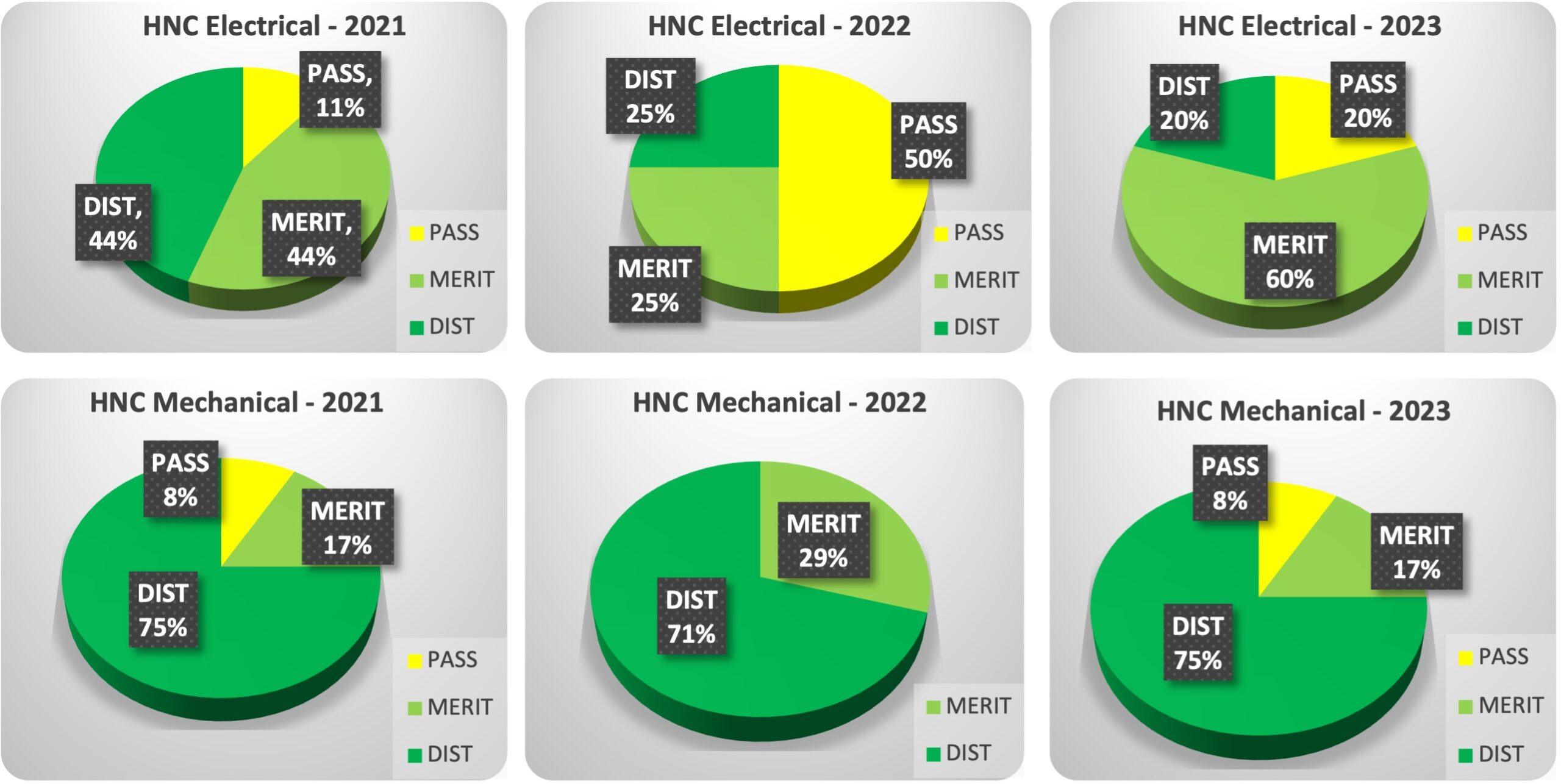Existing Apprentices
You can never have enough useful links, can you?
From quick links to external platforms, to useful information throughout your apprenticeship, you’ll find it all here.
student m365 login
Access your Appris Student accounts from the Training Centre, work or home.
smart assessor login
Your portal for work based evidence and tracking your off-the-job training.
bksb login
For those undertaking Functional Skills as part of their apprenticeship.
END POINT ASSESSMENT
Everything you need to know about completing your apprenticeship.
Stretch and Challenge
Aim high, go far! Where possible, we aim to challenge you to achieve the highest grade possible on some of the mandated qualification of your apprentice. By doing so, makes the transition to higher level qualifications smoother. Our statistics speak for themselves…




Progress onto Higher National Certificate Level 4
Many of our apprentices move on from completing their BTEC Level 3 to the HNC Level 4 qualification. This can be as a stand alone qualification or part of a Higher Apprenticeship (Level 4)

Feel safe, be safe…
The safety and wellbeing of all our apprentices is fundamental to supporting you throughout your apprenticeship.
Safeguarding Concern Form
If you are unable to make contact with the Safeguarding Team, or working outside normal business hours and want to inform us of a concern, click the link below to send a message to the team
Near Miss or Accident Form
Had an accident or near miss in the centre and forgot to record it with your Tutor? Click the link below to report.
Mental Health Concern
Supported by Unmasked Mental Health (UMH), should you wish to raise a concern for you or someone else’s mental health. Contact UMH below and one of trained specialists will help with you directly and confidentially.
01422 356945 (option 2)
During the hours of 8.30am and 4.30pm, Monday to Friday
Local Crime Statistics
Give consideration to your environment. Whether that’s leaving Appris in Bradford, your workplace or commuting to and from home in unsociable hours. Click the link below to view the monthly crime stats for a postcode area.
Training and Support
Linked to Fundamental British Values, over the course of your apprenticeship we will make reference to many of the following topics.
In many ways, mental health is just like physical health: everybody has it and we need to take care of it. Good mental health means being generally able to think, feel and react in the ways that you need and want to live your life. But if you go through a period of poor mental health you may find you’re frequently thinking, feeling or reacting, which will become difficult to cope with. This can feel just as bad as a physical illness.
Mental health issues can affect every day life. Whether at home, work, Appris or elsewhere. Our staff have completed mental health awareness training. However, to be able to offer specialist support, we have teamed up with Unmasked Mental Health, a local business that specialises in supporting young people’s mental heath.
Through a dedicated counselling services, Appris apprentices can access the services throughout their time on programme.
How to contact Unmasked Mental Health:
By telephone – During the hours of 8.30am and 4.30pm, Monday to Friday, apprentices can call the dedicated helpline on
01422 356945 (option 2)
Useful links:
Appris is committed to discharging its statutory and moral duty to support all learners. We are also committed to discharging any additional duties to promote and safeguard the welfare of all learners engaged in our activities.
Should you wish to raise a safeguarding issue, please do not hesitate to contact either of the Designated Safeguarding contacts below during normal working hours (Monday to Friday, 8.30am to 4.30pm).
Kenny Stoddart (email: k.stoddart@appris.co.uk or mobile: 07779 139526)
Mick Frost (email: m.frost@appris.co.uk or mobile: 07784 359108)
Both are supported by Designated Safeguarding Officers Bob Buxton and Yasmin Qauser. All can be contacted on the office telephone number, 01274 668149.
It is against the law to discriminate against someone because of a protected characteristic. It is against the law to discriminate against someone because of:
- age
- disability
- gender reassignment
- marriage and civil partnership
- pregnancy and maternity
- race
- religion or belief
- sex
- sexual orientation
These are called protected characteristics.
Dyslexia is a common learning difficulty that can cause problems with reading, writing and spelling. It’s a specific learning difficulty, which means it causes problems with certain abilities used for learning, such as reading and writing. Unlike a learning disability, intelligence isn’t affected.
Useful links:
British Dyslexia Association (bdadyslexia.org.uk)
Dyslexia Test | Dyslexia Foundation (dyslexia-help.org)
I am dyslexic and studying engineering – YouTube
Getting your driving licence and your first car gives a sense of freedom and excitement, certainly as a young person that recently passed their test. However, the statistics show that they are also at a higher risk of accidents. More information and statistics to support this are below:
- Stay Within Speed Limits: Speeding is a major cause of accidents. In 2020, speed was a contributing factor in 23% of fatal accidents in the UK.
- Avoid Distractions: Mobile phone use is a prominent issue. It’s estimated that a driver’s reaction time is two times slower if texting while driving compared to being on the legal alcohol limit.
- Never Drink and Drive: In 2019, around 240 people died in the UK due to accidents where at least one driver was over the drink-drive limit.
- Wear Your Seatbelt: It’s a simple action but crucial. In 2017, 27% of car occupants killed in crashes weren’t wearing a seatbelt.
- Understand Road Signs and Markings: Proper interpretation ensures safe navigation and understanding of road rules.
- Drive Appropriately for the Conditions: Wet, icy, or foggy conditions can drastically affect stopping distances and visibility.
- Stay Calm and Patient: Aggressive driving or rushing can lead to unnecessary risks.
- Maintain Your Vehicle: Regular checks on brakes, tyres, lights, and other vital parts ensure they’re in good working condition.
- Avoid Drugs and Medications That Impair Driving: Over-the-counter or prescribed medications can affect your ability to drive safely.
- Take Regular Breaks on Long Journeys: Fatigue can greatly reduce your reaction time and judgement.
- Use Indicators Properly: Failing to signal can confuse other road users, leading to accidents.
- Stay Updated with Changes in the Highway Code: The Highway Code contains vital rules, advice, and information for drivers.
Statistics:
- In 2020, there were 1,472 reported road deaths, a decrease of 16% from 2019.
- There were 115,584 casualties of all severities in 2020, down 25% from the previous year.
- Young drivers, especially those aged between 17-24, have a higher risk of being involved in a crash. This age group accounts for 7% of drivers but 15% of all road deaths.
Further Information:
For more in-depth details, updates, and advice related to road safety, please refer to:
- GOV.UK – Contains official statistics and guidance on road safety: https://www.gov.uk/government/organisations/department-for-transport
- THINK! Road Safety – UK government’s dedicated road safety initiative: http://think.direct.gov.uk/
- Brake – The road safety charity offering advice, campaigns, and resources: http://www.brake.org.uk/
Have you heard the phrase ‘county lines’?
A ‘County Line’ is a term used to describe gangs and organised criminal networks involved in exporting illegal drugs into one or more importing areas [within the UK], using dedicated mobile phone lines or other form of “deal line”. They are likely to exploit children and vulnerable adults to move [and store] the drugs and money and they will often use coercion, intimidation, violence (including sexual violence) and weapons”. For more information regarding Criminal Exploitation, you may find these further links useful:
https://www.nationalcrimeagency.gov.uk/what-we-do/crime-threats/drug-trafficking/county-lines
https://www.nspcc.org.uk/what-is-child-abuse/types-of-abuse/gangs-criminal-exploitation/
Citizens Advice, publishes a major report Unsecured and Insecured?, said people aged 17-24 years old came to them with 102,296 debt issues in the last year – 21 per cent more than the previous.
The charity says this increase comes against a backdrop of exploding unsecured borrowing among young people which risks trapping a new generation in problem debt.
The consumer champion has analysed official data which shows young people have an average unsecured debt of £12,215 – more than three times what it was (£3,988) before the financial crash between 2006-08.
The average total debts of young people grew by more than 200 per cent between 2006 and 2012, the last year data from the Wealth and Assets Survey is available.
Useful Links:
https://www.citizensadvice.org.uk/wales/debt-and-money/
https://www.childrenssociety.org.uk/information/young-people/advice/money-problems
There are many forms of gambling, and you may not immediately realise that some activities are indeed gambling. The Gambling Act 2005 sets out how gambling is regulated in Great Britain, and it covers arcades, betting, bingo, casinos, gaming machines, society lotteries, and online gambling. For most gambling activities, the legal age is 18. However, there are some which do not have any lower age restrictions, like playing on a 2p slot machine or making a private bet with one of your friends on the outcome of a game of FIFA, for example In 2019 47% of people in the UK had gambled in the past four weeks. That number remains at 32% when you take away the national lottery. Gambling Commission 2019
Different types of gambling activity:
- Arcades
- Sports betting
- Bingo
- Casinos
- Lotteries
- Private bets
- Gaming machines
- Esports betting
Source of information – www.ygam.com
Advice, tips and tools to help you make the best choices about your health and wellbeing.
Useful links:
Aged 16-25 and need help dealing with relationships, whether its breaking up, getting together or common problems.
Useful links:
https://www.relate.org.uk/relationship-help/help-young-adults
https://www.changegrowlive.org/advice-info/under-21-advice/relationships
What is Consent?
Legally, the definition of consent is when someone “agrees by choice and has the freedom and capacity to make that choice.”
The age of consent (the legal age to be able to consent to sex) in the UK is 16 years old. This law is there to protect young people from abuse and exploitation. The law isn’t designed to prosecute under 16s who are engaging in mutually consenting, non-abusive, sexual activity.
In another protective law, a person in a position of trust (for example a teacher, youth worker or carer) can’t engage in sexual activity with anyone under 18 who is in the care of their organisation.
Useful link:
www.fpa.org.uk/information-for-parents-sexual-health-week-2018
The Prevent duty is the duty in the Counter-Terrorism and Security Act 2015 on specified authorities, in the exercise of their functions, to have due regard to the need to prevent people from being drawn into terrorism. As Appris is defined as a specified authority, we continue to increase our knowledge on the subject. As such, all staff, Trustees and apprentices are required to complete the online course. To access the course and, including how to sign up, visit NaCTSO.gov.uk.ACT Awareness e-Learning is a joint project between Counter Terrorism Policing and the business community.
Link to additional training below:
http://www.elearning.prevent.homeoffice.gov.uk
What responsibilities do employers have as part of the duty?
All employers are expected to support this strategy. This would require employers being vigilant to help to spot any issues; changes in attitude or behaviours; or any other concerns about a learner’s health and well-being, which may lead to them being vulnerable and susceptible to radicalisation and extremism.
Additional documents of interest to staff and apprentices:
Digital safety during COVID-19
How hateful extremists are exploiting the pandemic – July 2020
Keeping Children Safe 2020 Prevent extract
Physical distancing search guidance
Special educational needs and disabilities (SEND) can affect a child or young person’s ability to learn. this can affect their:
- behaviour or ability to socialise, for example they struggle to make friends
- reading and writing, for example because they have dyslexia
- ability to understand things
- concentration levels, for example because they have ADHD
- physical ability
Useful links:
Information about mental health support for people who are lesbian, gay, bisexual, trans, intersex, queer or questioning (LGBTIQ+).
Useful Links:
https://www.stonewall.org.uk/help-advice/faqs-and-glossary/list-lgbtq-terms#n
The Education and Foundation Training (EFT) provide resources with modules on:
- Radicalisation and Extremist
- Staying Safe Online
- What Can You Trust | British Values
Have you considered how safe your information is online? Click the link below to access a presentation with embedded videos that will make you think twice about sharing your information (Disclaimer: Strong language used in some cases)
Check to see how secure your data has been compromised (link promoted by the Police)
Additional links to a growing number of educational resources aimed at young people and students to help promote the safe, lawful and constructive learning of cyber skills.
What can you do for Appris?
– Abide by Fundamental British Values
– Never tolerate a lack of respect for individuals
– Celebrate difference and promote diversity
– Be inclusive and accepting of difference
What can you do for Appris?
- Abide by British Values and the PREVENT duty
- Never tolerate a lack of respect for individuals
- Celebrate difference and promote diversity
- Be inclusive and accepting of difference
What can Appris do for you?
- Maintain a safe, respectful and mutually supportive environment
- Ensure that all of our employees, students and apprentices are aware of the Prevent Duty
- Provide training on the Prevent Duty and Appris’ duty of care in safeguarding our employees and students
- Help students to become valuable and rounded members of society who treat others with respect and tolerance, regardless of background
- Establish a culture where there is shared commitment to valuing diversity and respecting differences
www.grammarly.com is a very effective way of checking spelling and grammar of reports and assignments before submitting to Tutors and Training Advisors.

